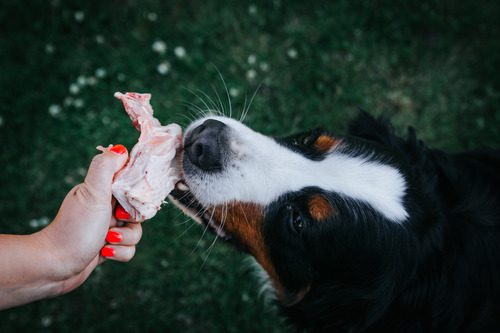Is Turkey Bad for Dogs?
Turkey is a staple in many households, especially during festive seasons. As you prepare your turkey feast, you may wonder, “Is turkey bad for dogs?” This question is common among pet owners who want to ensure their dog’s diet is safe and nutritious. While turkey can be a healthy addition to your dog’s diet, there are essential considerations to keep in mind. Let’s explore the benefits and risks of feeding turkey to your dog and how to safely incorporate it into their diet.

Understanding the Nutritional Value of Turkey
Turkey is a lean protein source, which can be beneficial for your dog’s health. It contains essential nutrients such as:
- Protein: Essential for muscle growth and repair.
- Vitamins B6 and B12: Vital for brain function and energy production.
- Niacin: Important for maintaining healthy skin and nerves.
- Selenium: An antioxidant that helps prevent cell damage.
- Phosphorus: Crucial for healthy bones and teeth.
These nutrients can support your dog’s overall health, making turkey a potentially valuable component of their diet. However, there are important factors to consider before you serve turkey to your furry friend.
Risks Associated with Feeding Turkey to Dogs
While turkey can be nutritious, it’s essential to be aware of potential risks:
- Bones: Turkey bones can splinter easily, posing a choking hazard or causing internal injuries.
- Seasoning and Additives: Many turkey preparations include seasonings, onions, garlic, and other additives that are toxic to dogs.
- Fat Content: Excessive fat can lead to pancreatitis, a serious condition in dogs.
- Skin: Turkey skin is high in fat and can cause digestive issues.
Understanding these risks is crucial to ensure your dog remains healthy and safe.
Bones: A Serious Hazard
Turkey bones, particularly cooked ones, can splinter into sharp pieces. These splinters can cause choking, puncture the gastrointestinal tract, or lead to severe internal injuries. Always ensure any turkey you feed your dog is free of bones.
Harmful Seasonings and Additives
Many recipes include seasonings, such as garlic, onions, and certain spices, which are toxic to dogs. These ingredients can cause severe health issues, including anemia and gastrointestinal distress. Stick to plain, unseasoned turkey to avoid these dangers.
High Fat Content and Pancreatitis
Turkey skin and fatty cuts can contribute to obesity and pancreatitis in dogs. Pancreatitis is a painful and potentially life-threatening condition that requires immediate veterinary attention. To prevent this, serve your dog lean turkey meat without the skin.
How to Safely Feed Turkey to Your Dog
To safely incorporate turkey into your dog’s diet, follow these guidelines:
- Choose Plain, Unseasoned Turkey: Avoid any turkey with seasoning, sauces, or additives.
- Remove Bones: Ensure all bones are removed before serving turkey to your dog.
- Serve in Moderation: Turkey should be an occasional treat, not a regular part of your dog’s diet.
- Monitor for Allergies: Some dogs may be allergic to turkey. Introduce it slowly and watch for any adverse reactions.
By following these steps, you can provide your dog with the benefits of turkey while minimizing risks.
Introducing Turkey to Your Dog’s Diet
When introducing turkey, start with small amounts to ensure your dog does not have an allergic reaction. Gradually increase the portion size if no adverse effects occur. Always consult with your veterinarian before making significant changes to your dog’s diet.
Turkey Alternatives: Other Lean Proteins
If you’re concerned about the potential risks of turkey, consider alternative lean protein sources such as chicken, fish, or lamb. Each of these proteins offers unique benefits and can be a healthy addition to your dog’s diet.
Chicken: A Popular Choice
Chicken is a common and easily digestible protein source for dogs. It’s generally well-tolerated and provides essential nutrients similar to turkey. Ensure it’s plain and free from bones and skin.
Fish: Nutrient-Rich and Beneficial
Fish, particularly salmon and sardines, are excellent for your dog’s skin and coat due to their high omega-3 fatty acid content. Be cautious of bones and ensure the fish is cooked and free of harmful additives.
Lamb: Ideal for Food Sensitivities
Lamb is a good alternative for dogs with sensitivities to common proteins like chicken or beef. It offers a different nutrient profile and can be a good addition to a balanced diet.
Consult Your Veterinarian
Turkey can be a nutritious treat for your dog when prepared and served correctly. By understanding the potential risks and following safe feeding practices, you can enjoy sharing this popular meat with your canine companion without compromising their health. Before making any changes to your dog’s diet, it’s important to consult with your veterinarian. They can provide personalized advice based on your dog’s specific needs and health status. If you have concerns or questions about feeding turkey to your dog, call Acton Animal Hospital at 978-263-7477 for expert guidance.
Recent Posts
About Us
Our veterinarians in Acton, MA bring over 80 years of combined experience and a multitude of services for your pet.
